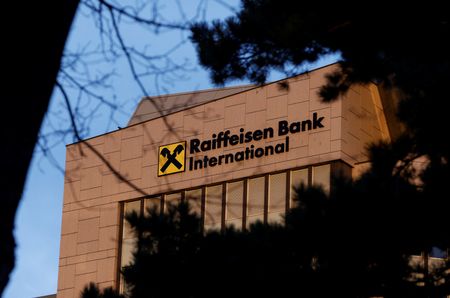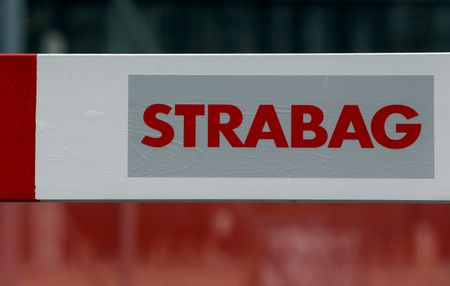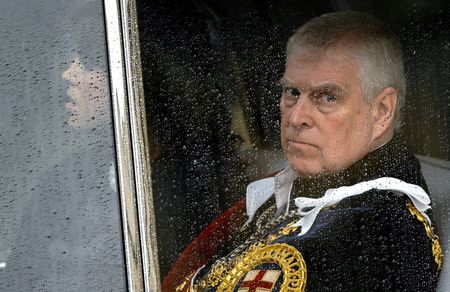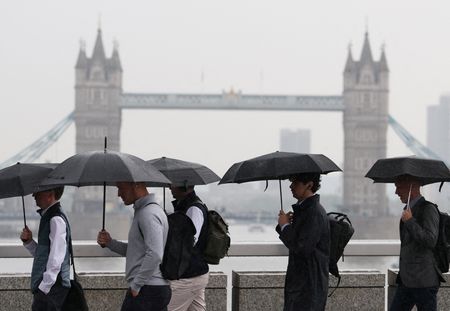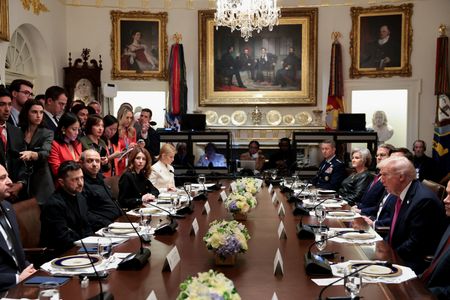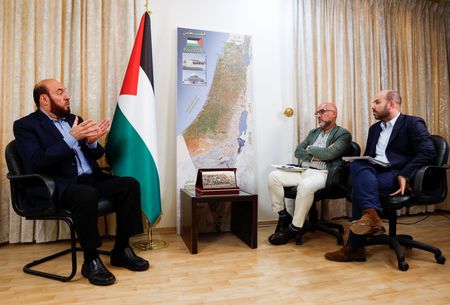VIENNA (Reuters) -A Russian court awarded more than 2 billion euros ($2.1 billion) of damages against the biggest Western bank in Russia, Austria’s Raiffeisen Bank International, in a landmark ruling underscoring the perils of doing business in Russia.
The case, in which lawyers for Raiffeisen accused the court of using intimidation tactics, is one of the most significant rulings against a Western company still operating in Russia, with one of the largest awards of damages yet.
Raiffeisen (RBI) said it would challenge the judgment against its Russian arm and seek to recover some of the money through legal action.
The bank said that it would also have to set aside a provision in last year’s financial accounts to help cover the 2 billion euro damage award.
Almost three years after Russia’s full-scale invasion of Ukraine, RBI’s continued presence in Russia underlines the lingering ties between Moscow and Vienna – with Vienna having served as a hub for cash from Russia and former Soviet states.
That bond put Raiffeisen and Austria on the front line of a global push by the United States to isolate Russia by reinforcing sanctions on banking and choking off access to Western goods after it invaded Ukraine.
Monday’s ruling illustrated Russia’s power to impose its own legal pressure on the Austrian bank.
“This lawsuit, with a huge number of gross violations, is an attempt to force the sale of blocked assets through a Russian court,” Andrei Timchuk, partner at Delcredere, representing Raiffeisen Bank, said in a statement.
Timchuk said the defendants’ ability to speak, file petitions and present evidence had been limited, accusing the court of seeking to rule in Rasperia’s favour as soon as possible.
“The court hearing was attended by unidentified armed people in balaclavas, whom the court sat next to the defendant with the obvious goal of exerting additional pressure,” he said.
The court could not be reached by phone and did not immediately respond to an emailed request for comment.
The dispute followed the failure of an earlier deal that Raiffeisen hoped would allow it unlock some of its frozen billions in Russia.
The case was centred on a claim by Russian investment company Rasperia against builder Strabag, its Austrian shareholders and the Russian arm of Raiffeisen.
RBI had sought to buy a stake in Vienna-based Strabag from Rasperia, which Strabag had linked to Russian tycoon Oleg Deripaska.
Washington identified Rasperia as part of a group of Russian companies still controlled by Deripaska, when it imposed sanctions on some of those involved.
A spokesperson for Deripaska reiterated on Monday that he had no links with the company at the heart of the dispute with Raiffeisen.
Raiffeisen has around 6 billion euros ($6.29 billion) in Russia earned from international payments and from billions of euros of Russian deposits, one person with knowledge of the matter has told Reuters.
Raiffeisen, with a myriad of industrial holdings, more than 18 million customers from Vienna to Moscow and 44,000 staff, has become a financial anchor for Austria and much of eastern Europe.
RBI has repeatedly said it wanted to spin off its Russian business. But almost three years into the war between Russia and Ukraine, little has changed.
While many Western governments have shunned Russia, some Austrian politicians have been reluctant to sever ties with a country still thanked for allowing Austria’s rehabilitation in 1955 following World War Two.
($1 = 0.9628 euros)
(Reporting by Moscow bureau, Alexander Marrow in London, Francois Murphy in Vienna, John O’Donnell in Frankfurt and Gnaneshwar Rajan in Bengaluru; Editing by Tomasz Janowski and Diane Craft)

